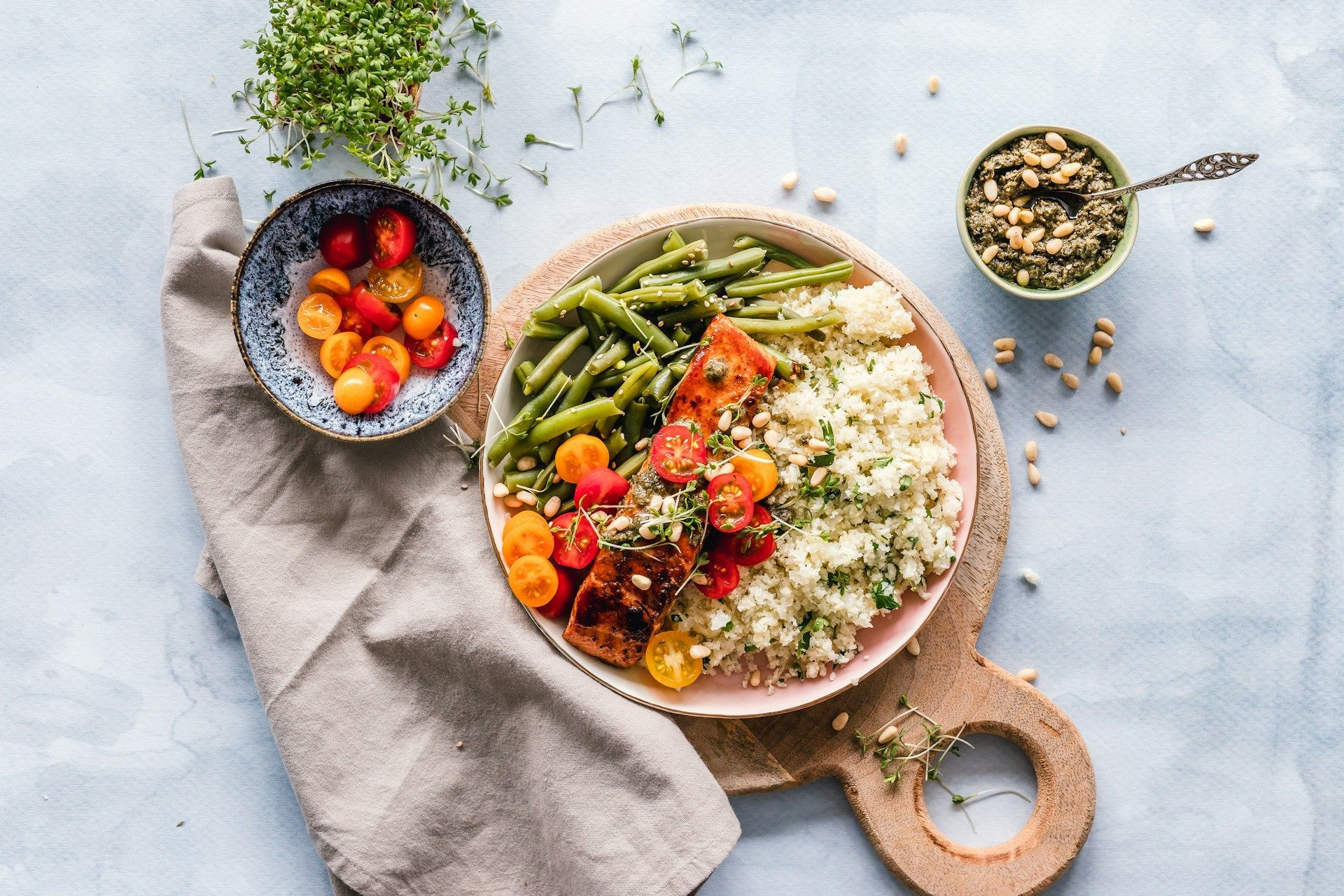Can You Improve Your Emotional Regulation Through Your Diet?
Wouldn’t life be easier if everyone got along? Sometimes, the cause of stress-producing conflict is an unfair world, but other times, the issue lies squarely with you and your maladaptive reactions to tense circumstances. I’m no stranger to this phenomenon, and emotional regulation is admittedly among my biggest challenges.
I’m also a fan of holistic medicine, which treats the whole patient versus beating symptoms into submission solely through allopathic means like prescription medications and surgery. Various factors influence your overall health and how disease manifests in your body and mind. While it’s often impossible to pinpoint a singular cause for your troubles, addressing each of the varying contributing factors can often bring considerable relief.
One example of this is how your diet can influence your mental health. Although a steady diet of salmon and spinach salads won’t cure anxiety or depression, ensuring your body has the right nutrients to produce various neurotransmitters in the right amounts can make a surprising difference in your mood and outlook. Can you improve emotional regulation through diet? Cleaning up your plate can’t hurt — and may help.
What Is Emotional Regulation?
Emotional regulation refers to your ability to use positive coping strategies to diffuse or moderate negative emotions. One example is hitting the gym after a tough day at work to burn off your frustration on the punching bag instead of turning your temper on your spouse or children.
Why does it matter? After all, this is America! Shouldn’t we all be free to express all our emotions, good or bad? Emotional regulation is crucial because acting impulsively in a pique of rage, frustration, or despair often makes a bad situation worse. You could shatter fragile relationships beyond repair and even harm yourself and others — for example, by driving erratically after an argument and causing an accident.
Emotional regulation shares much in common with maturity and is a critical component of it, but it doesn’t necessarily improve with age. There are older Americans in their 80s and 90s who still struggle with dysregulated emotions. Fortunately, it doesn’t matter how old you are. You can always take proactive measures to improve your emotional regulation, including adopting healthier daily practices, like cleaning up your diet.
Personal Aside: The Intensity of Dysregulation
If you follow Only in Sedona Yoga on YouTube (shameless plug: please like, subscribe, and share), you know that I talk to my mat to regulate my emotions. However, mindful movement alone isn’t always enough.
As someone with a trauma history, I learned some pretty downright horrific, let alone maladaptive, stress responses as a child and never unlearned them as an adult. When tough times struck after becoming ill with mysterious symptoms, I became horribly dysregulated. I lashed out at others, including those who only wanted to help (I’m so sorry, guys). While I complained of lacking a support system, it’s no wonder they left, considering I occasionally fired potshots over their bows.
I also hurt myself. When I was dysregulated, my emotions were so intense that I couldn’t see two fingers if I held them up right in front of my nose, let alone possible solutions to the problems I faced. That frustration added to the negativity, creating a rolling spiral that crushed everything in its path, including my spirit. However, in a panic to do something, anything, to save myself, I made some terrible decisions.
These days, I’m much, much better at not letting my negative emotions result in impulsive, erratic acts that make already bad situations even worse. I share this personal aside because I want you to know that you are not alone if your feelings sometimes feel so powerful, so intense, you have to act and act right beeping now, if only to make the voices in your head stop screaming.
However, there is hope. With time, I have gotten much less reactive. The emotions that once threatened to drown me now only go up my nose and burn my throat a little. I’m much better able to manage them, and you, too, will regain that feeling of control with time, practice, patience, and compassion toward yourself. Talking to the mat is responsible for a lot of my healing — but diet also plays a role.
Is Diet Alone Enough?
Let’s be clear: improving your diet can help with emotional regulation. It will not, however, transform you from the pre-ghost version of Ebenezer Scrooge into the new and improved one by itself.
Improving your diet is one piece of the holistic healing pie. However, you might notice two significant improvements after a few weeks of changing your eating patterns if you’re anything like me:
- The fire cools: Strong, dysregulated emotions are like wildfires, burning you from the inside until you take some action to douse the flames. Over time, an improved diet can decrease the intensity of these blazes so that you don’t have to fight as hard. You might still have moments, but they occur less frequently and blow over more quickly.
- The sky brightens: Sometimes, addressing a nutritional deficiency alone is enough to change your mood dramatically. Other times, the effects are more subtle, but the overall improvement in your outlook aids in making other healthy decisions, like sticking to your yoga program, that further accelerate healing.
How Diet Affects Emotional Regulation
Diet affects emotional regulation in several ways: through managing inflammation levels, preventing nutrient deficiencies, and nurturing a healthy intestinal microbiome. Here’s a closer look at each function.
1. Inflammation and Dysregulation
Generalized anxiety disorder is my bugbear, but I’m not alone. Rates of this disorder and depression increased 25% during the recent pandemic, during which substance abuse also rose. One way that diet affects mental health is by increasing or decreasing systemic inflammation. Systemic means it affects your whole body — including your brain.
For example, researchers have found an association between systemic inflammation and increased anxiety levels. Healthy foods, like the ones listed in the last part of this article, decrease systemic inflammation. Conversely, ultra-processed foods laden with white sugar, bleached flour, and unhealthy fats increase it.
2. Nutrient Deficiencies and Mental Health
As previously noted, deficiencies in certain minerals, such as magnesium, zinc, and selenium, can adversely impact mental health. While eating foods high in these substances helps, a well-rounded diet is equally important. Various micronutrients go into manufacturing neurotransmitters and maintaining bodily structures, and in general, the more brightly colored whole foods you include, the better —- it ensures sufficient intake of everything.
3. Your Microbiome and Mental Health
Researchers have found an association between disruptions in the intestinal microbiome and the following mental disorders:
- Anxiety
- Depression
- Schizophrenia
- Bipolar disorder
- Autism spectrum disorder
- Eating disorders
Your intestinal microbiome refers to the colonies of beneficial bacteria lining your intestines. They help you digest and much more. For example, you make 95% of your body’s serotonin in your gut, and many researchers believe these pint-sized powerhouses send messages to your brain, influencing mood.
9 Best Foods to Improve Your Emotional Regulation Through Diet
The best foods to improve emotional regulation through your diet, therefore, address these three factors. Here’s what to add more of to boost your mood and outlook.
1. Nuts
Nuts are among the best sources of those miracle mental minerals: magnesium, selenium, and zinc. Although they’re often salty-tasting, they contain oodles of potassium to mitigate the impact on your blood pressure. They’re great for solo snacking as an alternative to chips, and you might be surprised by the prices — many varieties are roughly equivalent in price to junk food these days. Choose health and nutrition over inflammatory snacks.
2. Seeds
Seeds are also mental miracle mineral sources, but they are especially beneficial to women. That’s because they contain lignans, phytoestrogens that may balance female hormones and decrease period-related anxiety and depression. Flaxseed is particularly beneficial and may help post-menopausal women reduce their breast cancer risk.
3. Fatty Fish
Fatty fish makes this list because it is your best source of omega-3 fatty acids. Researchers associate deficiencies in these substances with various mental disorders, including anxiety, depression, and Alzheimer’s disease. Although you can find omega-3s in foods like flaxseed, only seafood contains DHA and EPA, two forms of omega-3 your body struggles to make from plant-based sources.
4. Yogurt
It’s time to nurture your microbiome. How do you do that? With probiotics and prebiotics. Prebiotics refer to a type of dietary fiber these microscopic bacteria love. Probiotics are the organisms themselves, which exist in fermented foods like yogurt. Although you are born with a stash of them, they deplete over time — add more through diet. Other probiotic-rich, fermented foods include:
- Sauerkraut
- Kimchi
- Miso
- Kombucha
- Kefir
5. Berries
Berries are a rich source of anthocyanins. These antioxidants occur in red and blue food and are particularly good for combating inflammation in your heart and brain.
6. Broccoli and Leafy Greens
Broccoli and deep, leafy greens are nutrient powerhouses. They contain many of your B vitamins, iron, and filling fiber to nurture your microbiome while keeping you fuller for longer. A salad with nuts, greens, berries, and a yogurt dressing is a lovely lunch for improving your emotional regulation through diet.
7. Whole Grains
Whole grains complete the B-vitamin puzzle. However, it’s crucial to read labels, ensuring they read “whole grain” or “whole wheat.” Be wary of combos — a label that says “wheat flour” and “whole wheat flour” may contain only a smidgen of the good stuff.
Why does it matter? The nutrition and fiber you want are in the bran and germ, which manufacturers strip away when processing flour. As a result, eating refined flour is akin to consuming sugar for its effect on your blood glucose, which can increase your Type 2 diabetes risk.
8. Turmeric
Turmeric is a miracle spice. However, it works best with its inflammation-fighting sidekick, black pepper, as the piperine increases your body’s ability to use the curcumin in this root herb by 2,000%. Add a bit of each to your morning tea. As a bonus, adding turmeric’s anti-inflammatory power to your daily routine could ease chronic pain.
9. Green Tea
If coffee makes your anxiety worse, try green tea. Although it has some caffeine, it pales compared to a cup of joe — about 15 milligrams versus 200. Additionally, green tea is a fabulous source of EGCG, an antioxidant that may ease depression symptoms and make you less impulsive if you have certain mood or personality disorders.
Foods to Avoid to Improve Your Emotional Regulation Through Diet
The foods you should avoid to improve your emotional regulation through diet include most, if not all, ultra-processed foods, as they increase inflammation. You should also avoid any that cause a food allergy, even if your physical symptoms seem mild — get mindful and journal about how you feel after suspect meals if uncertain.
For example, stay clear of the following as much as possible:
- Processed convenience meals
- Fried foods
- Many snack foods, such as chips, pretzels and crackers
- Many baked goods, especially those with bleached flour and lots of sugar
- Candy
Holistic Healing: Improving Emotional Regulation Through Diet
A holistic approach to health requires you to examine multiple factors that give rise to unwanted symptoms. While fixing your diet alone is unlikely to cure your mental health symptoms, you can improve your emotional regulation through the foods you choose.
Feeling dysregulated and out of control is scary and can lead to increased stress and strife in your life. It only makes sense to keep yourself as balanced as possible through any means available to you. Add more of these nine foods to improve your emotional regulation through your diet and mindfully tune into and perhaps journal about how you feel. The difference may impress you.











